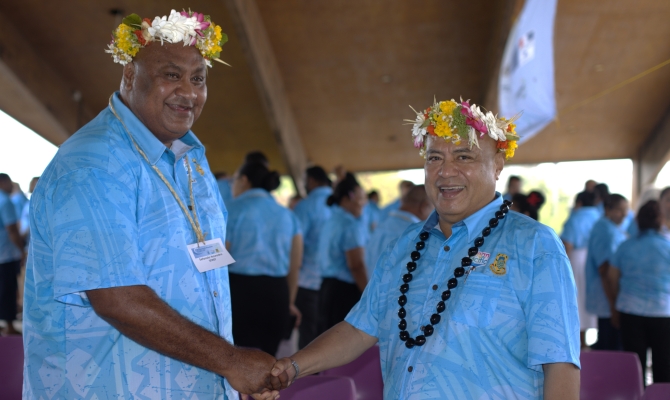Officials and delegates at the Fourth Clean Pacific Roundtable (4CPRT) have been urged to develop tailor-made waste disposal and management measures that are of practical use and application to circumstances in Pacific countries.
The call came from Feleti Teo, Prime Minister of Tuvalu, when he opened the Fourth Clean Pacific Roundtable (4CPRT) at the Rt. Hon. Dr Sir Tomasi Puapua Convention Centre (TPCC), Funafuti Tuvalu, on Monday.
From 05 – 09 August 2024, more than 200 delegates are gathering on the atoll nation to strengthen and advance the journey towards a Cleaner Pacific. This is the first face-to-face CPRT since COVID-19.
“As we all know, the management of waste materials is a worldwide problem. For the Pacific, the problem is becoming acute due to capacity constraints and increasing urban populations,” said Teo.
For Tuvalu, the problem is evidently stark due to limited land space for landfill disposal and the unavailability of suitable equipment for waste disposal and waste storage.
The Government has to lease land from landowners to set up controlled dumpsites on each island and more often, the sites are not well staffed and there is no functional equipment to compact and cover the deposited waste.
Tuvalu’s economy is also heavily reliant on imported goods. Almost all goods are imported including consumable goods, building material, medical supplies, electronics, computers, vehicles and so forth. The environmental and health impacts of this on communities in Tuvalu are significant.
“I hope, having the Roundtable meeting here in Tuvalu this week, further highlight the importance and seriousness of the issue of waste disposal and management given the potential environmental and health impacts if the disposal and storage of waste is not managed properly and safely,” said Teo.
The Prime Minister of Tuvalu acknowledged the Clean Pacific Roundtable as a platform to foster sustainable deliberations and collaboration amongst Pacific countries and development partners, private sector and civil society.
“For waste management to be effective, a more holistic approach is needed that encapsulates specific legislation and policy, supported by responsible institutional and governance structures with tailored-made strategic plans and context-specific technology and equipment,” said Teo.
Facilitated by the Secretariat of the Pacific Regional Environment Programme (SPREP), with Members and partners, the CPRT exists to encourage networking and dialogue, improve donor coordination, mobilise technical and financial resources and to monitor the progress of the Cleaner Pacific 2025.
Cleaner Pacific 2025 is a comprehensive long-term strategy for integrated sustainable waste management and pollution prevention and control in the Pacific islands region until 2025. It provides a strategic management framework to address waste, chemicals and pollutants that will reduce associated threats to sustainable development of the region.
For all Pacific countries, finances is a big challenge.
“In that regard, I value regional gatherings of this sort where common national challenges are discussed and identified and if those national challenges can be addressed through regional solutions by pooling and sharing of resources, then I challenge the Roundtable to come up with such regional solutions,” said Teo.
“I understand, there are in operation offshore recycling and waste disposal facilities. If a regional facility of that kind for the Pacific can be pursued and established, it will assist tremendously countries like Tuvalu with severe capacity constraints. I know the Roundtable also includes representatives of development partners and representatives of the private sector and civil society. And I therefore implore all delegates to work cooperatively and be bold and innovative in your search for solutions for the chronic development challenge of waste disposal and waste management in the Pacific, especially in places like Tuvalu.”
The Roundtable this week is designed to expand networking opportunities by way of seven dialogue sessions and two consultation sessions for all stakeholders to address waste management issues. These range from plastic pollution, hazardous waste, landfill management, bulky waste, disaster response, recoverable items, E-waste, used oil, organics, end-of-life vehicles, to new technologies. The Roundtable will also review the implementation of the Cleaner Pacific 2025 and start conversations of what the aspirations are for the next iteration of the Strategy – Cleaner Pacific 2035 with the theme of “Clean Environment, Resilient Ocean and Healthy Communities.”
SPREP’s Director General, Sefanaia Nawadra encouraged the participants to be frank in their deliberations.
“The Clean Pacific Roundtable, whilst a fairly new regional forum is an ideal conduit for progressing innovative solutions and capitalising on new initiatives as we navigate together towards a pollution-free Pacific. The popularity and interest in this event highlights the importance of regional waste and pollution management to the region,” Nawadra said.
“As we start the development of the Cleaner Pacific 2035, it is imperative that Pacific Island countries move from a linear model to one of circularity that advocates sustainable production and consumption. We are mindful that indigenous and traditional knowledge already embodies Circularity approaches such as composting and farming. We also want our Pacific countries to put in place processes and policies that will enable a Circularity, which includes but is not limited to bans on products that we do not want, such as single-use plastics.
“Actions are important however it requires a more concerted and coordinated approach that will help in the monitoring and reporting on the implementation progress of the Cleaner Pacific strategy.”
Nawadra acknowledged the significant financial assistance of Australia, European Union, Fonds Pacifique, and JICA as well as contributions from UNEP, World Bank, and USAID.
The colourful opening ceremony kicked started with a traditional performance and a prayer by Pastor Fitilau Puapua, the President of Ekalesia Kelisiano Tuvalu.















